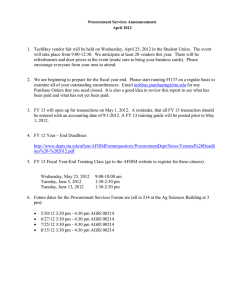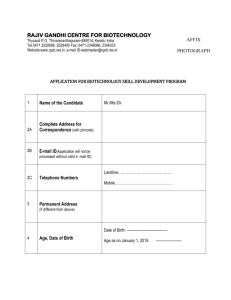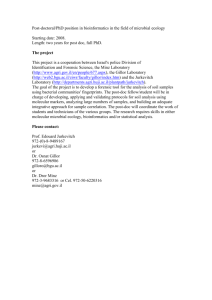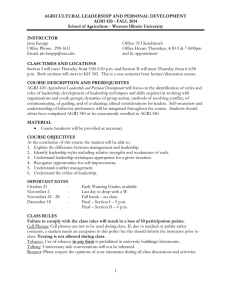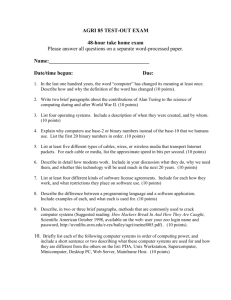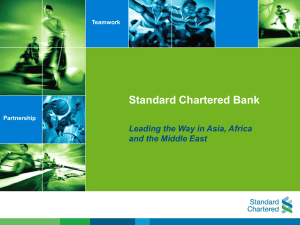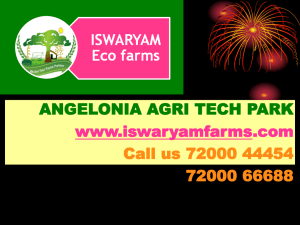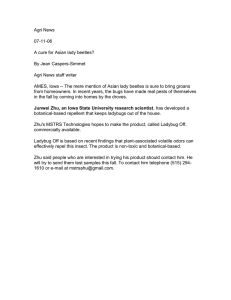BSc (Hons) Crop Technology (Minor: Landscape Management) (Full-Time) 1. Objectives
advertisement
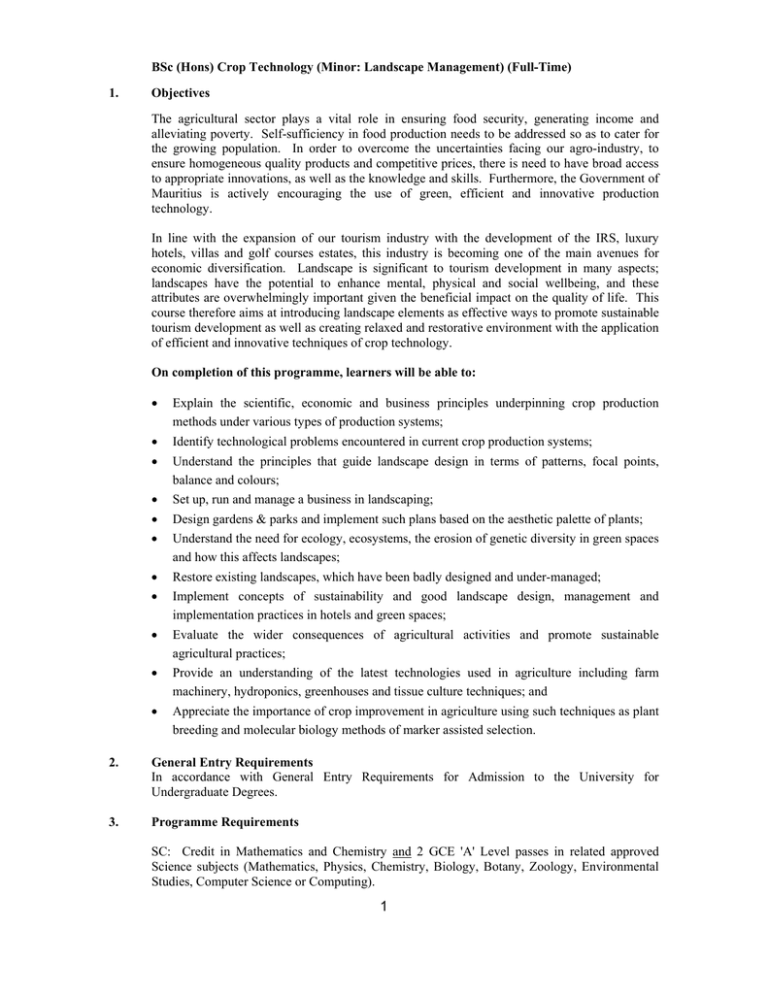
BSc (Hons) Crop Technology (Minor: Landscape Management) (Full-Time) 1. Objectives The agricultural sector plays a vital role in ensuring food security, generating income and alleviating poverty. Self-sufficiency in food production needs to be addressed so as to cater for the growing population. In order to overcome the uncertainties facing our agro-industry, to ensure homogeneous quality products and competitive prices, there is need to have broad access to appropriate innovations, as well as the knowledge and skills. Furthermore, the Government of Mauritius is actively encouraging the use of green, efficient and innovative production technology. In line with the expansion of our tourism industry with the development of the IRS, luxury hotels, villas and golf courses estates, this industry is becoming one of the main avenues for economic diversification. Landscape is significant to tourism development in many aspects; landscapes have the potential to enhance mental, physical and social wellbeing, and these attributes are overwhelmingly important given the beneficial impact on the quality of life. This course therefore aims at introducing landscape elements as effective ways to promote sustainable tourism development as well as creating relaxed and restorative environment with the application of efficient and innovative techniques of crop technology. On completion of this programme, learners will be able to: Explain the scientific, economic and business principles underpinning crop production methods under various types of production systems; Identify technological problems encountered in current crop production systems; Understand the principles that guide landscape design in terms of patterns, focal points, balance and colours; Set up, run and manage a business in landscaping; Design gardens & parks and implement such plans based on the aesthetic palette of plants; Understand the need for ecology, ecosystems, the erosion of genetic diversity in green spaces and how this affects landscapes; Restore existing landscapes, which have been badly designed and under-managed; Implement concepts of sustainability and good landscape design, management and implementation practices in hotels and green spaces; Evaluate the wider consequences of agricultural activities and promote sustainable agricultural practices; Provide an understanding of the latest technologies used in agriculture including farm machinery, hydroponics, greenhouses and tissue culture techniques; and Appreciate the importance of crop improvement in agriculture using such techniques as plant breeding and molecular biology methods of marker assisted selection. 2. General Entry Requirements In accordance with General Entry Requirements for Admission to the University for Undergraduate Degrees. 3. Programme Requirements SC: Credit in Mathematics and Chemistry and 2 GCE 'A' Level passes in related approved Science subjects (Mathematics, Physics, Chemistry, Biology, Botany, Zoology, Environmental Studies, Computer Science or Computing). 1 4. Programme Duration Normal (Years) 3 Degree Maximum (Years) 5 5. Credits per Year: Minimum 18 credits, Maximum 48 credits subject to Regulation 4. 6. Minimum Credits Required for the Award of Undergraduate Degree: 106 Breakdown as follows: Degree Credits from Core Taught Modules 97 Project 9 The modules Practical Training – AGRI 2000 and Scientific Communication Skills and Methods – AGRI 2130 must be completed satisfactorily for the award of the degree. Students may exit with a: 7. Certificate after having earned 30 credits in core modules. Diploma after having earned 60 credits in core modules. Assessment Each module will be assessed over 100 marks (i.e. expressed as %) with details as follows (unless otherwise specified). Assessment will be based on a Written Examination of 2-3 hour duration, carrying a weighting of 70%, and Continuous Assessment carrying 30% of total marks for AGRI modules. Continuous Assessment will be based on laboratory/field works, and/or assignments, and should include at least 1 class test. Written examinations for all AGRI modules will normally be carried out at the end of the academic year. An overall total of 40% for combined Continuous Assessment and Written Examination would be required to pass a module, without minimum thresholds within the individual Continuous Assessment and Written Examination. Modules will carry the weightings of 1, 3 or 5 depending on their status (Introductory, Intermediate or Advanced). Weighting for a particular module is indicated within parentheses in the module code. Each module will carry credits in the range of 3 to 6. Project – AGRI 3000Y(5) will carry 9 credits. Assessment of the module AGRI 2000 - Practical Training will be based on the On-site Supervisor’s Evaluation and the Student’s Portfolio. For satisfactory completion of the Practical Training, a minimum of 40% should be attained. Assessment of the module Scientific Communication Skills and Methods – AGRI 2130 will be based on continuous assessment throughout the module and/or submission of a portfolio. The module carries no credits. For satisfactory completion of the module, a minimum of 40% should be attained. Submission Deadlines for Dissertation • First Draft: by last week of February of the Academic Year. • Final copy: three copies of the dissertation (two spiral-bound copies and one soft copy in a single PDF text file on an electronic storage media) should be submitted to the Faculty Registry not later than the last week day of March of the academic year by 4.00 p.m at latest. 2 8. Academic Teaching in Case of an Emergency To ensure minimal disruption of normal academic teaching in case of an emergency (eg. closure of the University for more than 2 weeks), the i.Learn e-Learning Platform of VCILT will be used to deliver Teaching and Learning content. Relevant learning resources will be posted on the Platform. Assignments (if any) will be submitted using the online submission box. Arrangements will be made to register students on the e-Learning platform at the beginning of the academic year. 9. List of Modules CORE MODULES Code COMS1010(1) AGRI 1018Y(1) AGRI 1079Y(1) AGRI 1050Y(1) AGRI 1071Y(1) AGRI 1080Y(1) AGRI 1081Y(1) Module Name Hr / Yr L+P DE 45+60 45+60 60+60 30+30 45+45 45+30 Credits 30+45 45+0 3 3 60+60 6 AGRI 2000 AGRI 2258Y(3) Communication Skills Agricultural Chemistry and Soil Science Plant Science Crop Production: Science and Technology Data Handling and Research Methodology Introductory Biochemistry & Microbiology Landscape Construction, Design & Management 1 IT and Applications Introduction to Agricultural Economics, Management and Systems Practical Training Agricultural Engineering: Applications AGRI 2074Y(3) Crop Propagation, Nutrition & Fruit Production 60+45 5 AGRI 2075Y(3) AGRI 2260Y(3) Environmental and Sustainable Horticulture Postharvest Technology 45+0 45+0 3 3 AGRI 2078Y(3) Genetics & Plant Breeding of Crops and Ornamentals Pests, Diseases and Weeds Control Experimental Designs and Sampling Techniques Scientific Communication Skills and Methods Plant Production & Nursery Management 60+60 6 45+60 30+30 35+0 60+30 5 3 5 AGRI 1082Y(1) AGRI 1086Y(1) AGRI 2089Y(3) AGRI 2112Y(3) AGRI 2130 AGRI 2259Y(3) 3 5 5 6 3 4 4 AGRI 3000Y(5) AGRI 3026Y(5) AGRI 3099Y(5) AGRI 3133Y(5) AGRI 3134Y(5) Project Crop Production Technologies Turfgrass Production and Management Landscape Ecology & Biodiversity Landscape Construction, Design & Management 2 60+45 60+30 60+30 60+30 9 5 5 5 5 AGRI 3135Y(5) Entrepreneurship and Innovations for agribusiness 60+30 5 Total Number of Credits = 106 AGRI 2000 - Practical Training can be done in either Year 1 or Year 2. AGRI 2130 - Scientific Communication Skills and Methods will be done in Semester 2 in Year 2. 3 10. Programme Plan- BSc (Hons) Crop Technology (Minor: Landscape Management) YEAR 1 CORE MODULES Code Module Name COMS1010(1)* AGRI 1018Y(1) AGRI 1079Y(1) AGRI 1050Y(1) AGRI 1071Y(1) AGRI 1080Y(1) AGRI 1081Y(1) Communication Skills Agricultural Chemistry and Soil Science Plant Science Crop Production: Science and Technology Data Handling and Research Methodology Introductory Biochemistry & Microbiology Landscape Construction, Design & Management 1 AGRI 1082Y(1) IT and Applications AGRI 1086Y(1) Introduction to Agricultural Economics, Management and Systems Hr / Yr L+P DE 45+60 45+60 60+60 30+30 45+45 45+30 Credits 30+45 3 45+0 3 Hr / Yr L+P 60+60 Credits 3 5 5 6 3 4 4 *To be taken is Semester 2 YEAR 2 CORE MODULES Code Module Name AGRI 2000 AGRI 2258Y(3) Practical Training Agricultural Engineering: Applications AGRI 2074Y(3) Crop Propagation, Nutrition & Fruit Production 60+45 5 AGRI 2075Y(3) AGRI 2260Y(3) Environmental and Sustainable Horticulture Postharvest Technology 45+0 45+0 3 3 AGRI 2078Y(3) AGRI 2089Y(3) AGRI 2112Y(3) AGRI 2130 AGRI 2259Y(3) Genetics & Plant Breeding of Crops and Ornamentals Pests, Diseases and Weeds Control Experimental Designs and Sampling Techniques Scientific Communication Skills and Methods Plant Production & Nursery Management 60+60 45+60 30+30 35+0 60+30 6 5 3 5 6 AGRI 2000 - Practical Training can be done in either Year 1 or Year 2. AGRI 2130 - Scientific Communication Skills and Methods will be done in Semester 2 in Year 2. YEAR 3 CORE MODULES Code Module Name Hr / Yr L+P 4 Credits AGRI 3000Y(5) AGRI 3026Y(5) AGRI 3099Y(5) Project Crop Production Technologies Turfgrass Production and Management 60+45 60+30 9 5 5 AGRI 3133Y(5) Landscape Ecology & Biodiversity 60+30 5 AGRI 3134Y(5) Landscape Construction, Design & Management 2 60+30 5 AGRI 3135Y(5) Entrepreneurship and Innovations for agribusiness Total Number of Credits = 106 60+30 5 5
